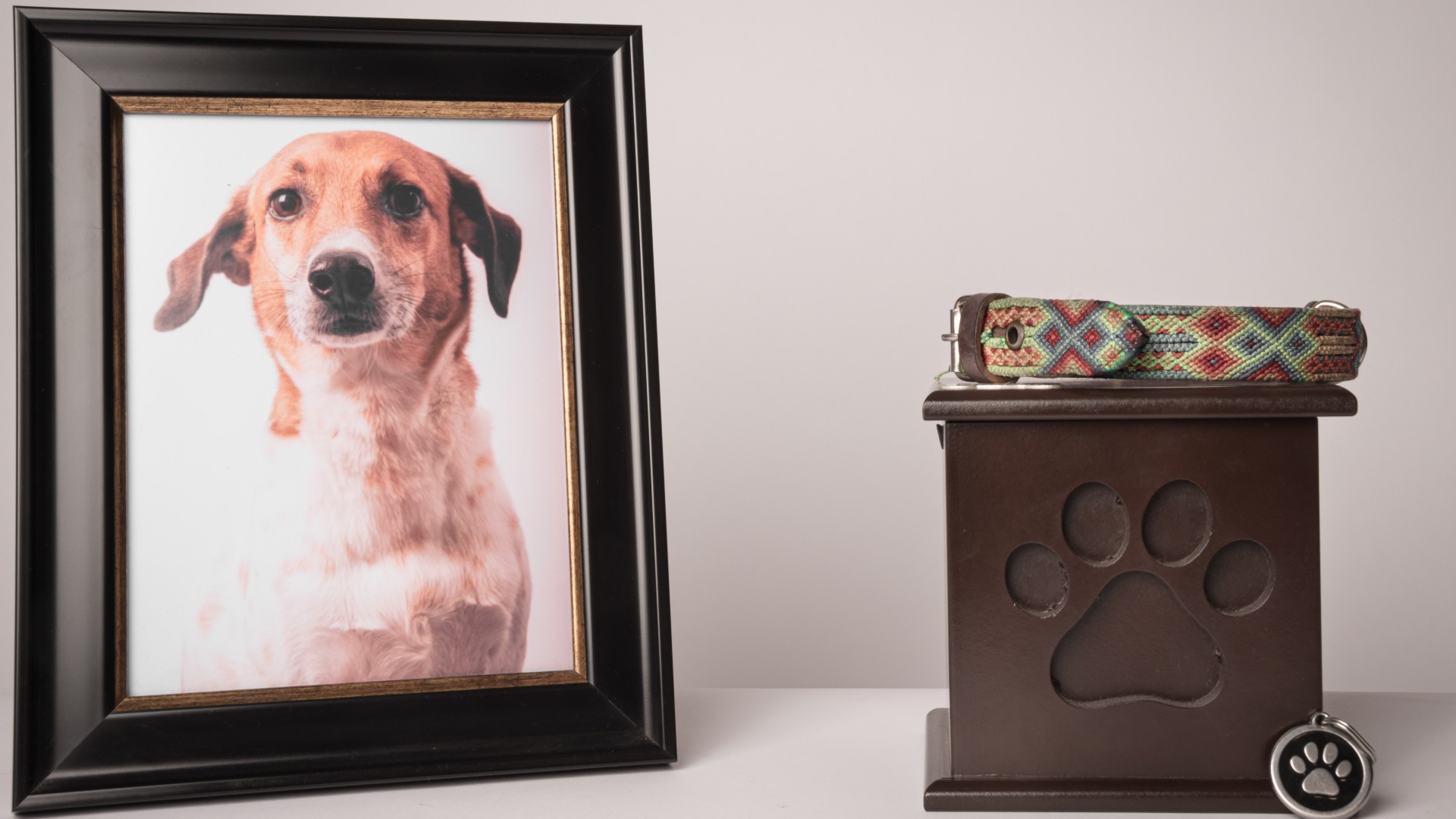Seven things nobody tells you when your pet dies
The death of a pet can hurt as much as the death of a person, here are seven things to remember as you navigate your grief

Get the best advice, tips and top tech for your beloved Pets
You are now subscribed
Your newsletter sign-up was successful
There are few things in life more painful than the death of a pet. Chances are that your fur friend was a fully-fledged member of your family who brought a great deal of joy to your home, and life without them may well be feeling unbearable right now.
If that weren’t hard enough, society often minimizes and diminishes the grief that comes with pet bereavement, which can leave you feeling even more isolated and alone. Yet for many of us, the death of a pet can feel even harder than the death of a human loved one.
Our pets offer us unconditional love, comfort, and affection. They stand faithfully by our side during times of joy and sorrow and provide us with the opportunity to experience a relationship where we don’t have to be anyone other than ourselves. We are loved by them simply for being who we are and we love them all the more because of that.
Very rarely is the death of a pet seen as a legitimate source of grief and yet it’s important you understand that whatever feelings you’re experiencing right now are real and valid. Below, we walk you through seven things nobody tells you when your pet dies that we hope will provide a sense of comfort, help you feel less alone and better know how to cope with the loss of a pet.

Kathryn holds a Master of Social Work from Massey University in Auckland, specializing in grief and loss. She worked for over a decade in end of life care at hospices in New Zealand and England, first as a social worker and then in an education role where she helped clinicians to navigate sensitive conversations with patients and their families. While she is largely taking a break from the world of death and dying to focus on writing, she remains an Associate Lecturer in the School of Health and Social Wellbeing at the University of the West of England.
1. You need time to grieve
While society may try to tell you otherwise, it’s important to remember that grief is a process, not a one-time event . In their moving book On Grief and Grieving, psychiatrist Elisabeth Kubler-Ross and death and grief expert David Kessler speak eloquently about the realities of losing a loved one.
“The reality is that you will grieve forever. You will not “get over” the loss of a loved one; you will learn to live with it. You will heal and you will rebuild yourself around the loss you have suffered. You will be whole again but you will never be the same. Nor should you be the same. Nor would you want to!”
Kubler-Ross and Kessler made it clear that the grief that comes from the death of a pet is not as easily resolved as some would have us believe. It requires the same time, space, and attention as any other bereavement and cannot be rushed through.
Get the best advice, tips and top tech for your beloved Pets
For many of us, the death of those we love, whether human or animal, stays with us for our entire lives. We don’t grieve deeply and then pop out the other side of grief a few days or weeks later fully healed. Instead, we learn to grow our lives around our grief with the understanding that grief may continue to visit us in waves forever more.
We acknowledge that creating time to consciously grieve is easier said than done when you likely have other commitments to attend to, such as work or family. However, we recommend carving out some space each day to honor your grief, whether that’s a short walk outside in nature or 15 minutes spent with a cup of tea first thing in the morning before everyone else gets up.
2. It’s ok to feel all of your feelings

Grief is the price we pay for love. It is a natural reflection of life and can appear whenever we lose a relationship where we had feelings and attachments. Depending on how long your pet was in your life for, you likely spent hundreds if not thousands of hours with them building and nurturing a deep and loving bond.
And yet, many bereaved pet owners feel they need to hide their pain from those around them because the grief that comes from the death of a pet is a form of disenfranchised grief - a type of grief that society deems as ‘less than’ other forms of grief, such as that experienced by those who are grieving the death of a human loved one.
Statements such as ‘it was just a cat’, ‘it’s not like your dog was a person’, ‘you can always get another animal’, and ‘well, at least you still have your family’ are all incredibly unhelpful and can leave you feeling as if your grief is being judged by others to be unworthy.
Despite your best efforts, you may find yourself absorbing these messages and feeling like something is wrong with you for feeling sad. You may feel you need to get over your grief and move on. When you let these external voices in and judge yourself for how you’re grieving or the extent of your grief, you silence and betray your genuine feelings.
Give yourself permission to feel and honor all of your feelings. Whether you’re feeling grief, pain, regret, loneliness, anger, sadness, or any other strong emotion, let yourself feel your feelings and allow them to move through you. You may also have moments of feeling joy amidst your grief - allow yourself to feel this too. Doing so is not dishonoring your pet’s memory but is instead a recognition that grief and joy can coexist.
3. Grief isn’t just about death - it’s about loss
Many of us associate grief with an intense feeling of sadness associated with the death of a human loved one or pet. But what we don’t often realize is that we are not simply grieving our pet’s death - we’re grieving the loss of their physical presence in our daily lives.
Perhaps your pet slept beside you in bed. Maybe they were always curled up next to you while you were working. They could have been the one you cuddled with when you’d had a hard day or the one you played with when you were in need of some fun.
Think of your life as being a story that’s being built chapter by chapter. Your pet was likely an integral part of a good chunk of the story that has been your life so far and so you’re not just grieving their death, you’re also grieving the daily moments, rituals, and routines that made up your life together and the moments you may also have hoped to share with them in the future that are no longer a possibility.
4. Holding a ceremony and creating a memorial can help you to honor your pet

Grief used to be something we experienced as a community. In times gone by, a bereavement was seen as a time to come together and honor and attend to the many different types of grief that touch each of our lives. Today, much of this sense of togetherness has been lost and many of us are forced to navigate the terrain of grief in the absence of community.
Ritual remains an important and necessary part of the grieving process and we encourage you to consider conducting some form of ceremony to honor both your pet and the relationship that you shared together. This may be burying them under a tree in your back garden if you have the space to do this or scattering their ashes in a favorite spot. You may choose to read a poem, sing a song, or simply sit in quiet reflection with your thoughts.
Many people also find it helpful to create a memorial for their pet. For some, that might look like planting a tree, putting a bench in the garden with a plaque that dedicates that spot to their pet, or creating a sacred space in the home with some photos and personal items that belonged to their fur friend.
While creating a memorial may sound strange, in his book Continuing Bonds: New Understandings of Grief, psychologist Dennis Klass revealed that we don’t detach from those we love or leave them behind when they die but instead carry them with us throughout our lives. Having a space where you can talk to your pet, think about them, feel close to them, and stay attached to them may be viewed by society as pathological but these are natural, normal, and healthy behaviors for bereaved people to engage in.
5. Finding an outlet for your grief can help you heal
In the depth of grief, it can be hard to find the words to express to others how you feel. Perhaps you don’t have anyone you feel comfortable sharing your grief with or maybe those close to you want to be supportive but simply don’t know how. In times like these, it can be helpful to have other outlets we can fall back on that allow our feelings to be felt, expressed, and released.
Writing about your feelings and experiences in a journal is something that some people find very healing. A blank page can provide you with the opportunity to write about the life you and your pet shared together, what they meant to you and what emotions are coming up for you as you adjust to being without their physical presence.
If words don’t feel like the right creative outlet for you, other expressive arts may resonate more. Things like listening to music or singing are wonderful for facilitating the flow of emotions and drawing and painting allow us to visually express our internal landscape.
Other ideas include creating a collage using photos of you and your pet, tapping into the therapeutic benefits of gardening, doing a grief meditation or series of grief yoga poses, or turning to dance and theater, both of which allow you to embody and release your emotions through physical actions.
6. Seeking support is nothing to be ashamed of

You would be amazed how hard many pet parents are on themselves when they’re grieving the death of their pet. It’s incredibly common to hear people say things like ‘I shouldn’t be feeling this way’, ‘I should be over it by now’, or ‘they were just a dog/cat’. Minimizing your grief and trying to carry on as if your pet hasn’t died and your pain isn’t real, is to do yourself a huge disservice.
Depending on the relationship we shared with our pet and the relationships we have with the humans around us, the death of our animal companion may well feel more painful than the death of any person could. While you may feel most comfortable navigating your grief journey on your own, please know that there is no shame in reaching out to a licensed health professional for support.
The following directories can help you locate a therapist or counselor in your area:
- American Counseling Association
- Mental Health America
- UK Council for Psychotherapy
- British Association for Counselling and Psychotherapy
The right therapeutic environment can help facilitate healing, providing you with a safe and secure space to share your feelings and have them held in a supportive way. You may find that having someone acknowledge and validate your feelings as legitimate gives you permission to do the same.
7. It’s worth taking some time before getting a new pet
It’s not unusual in the aftermath of your pet’s death to be told by well-meaning family and friends that you should simply go out and get another one. We often struggle to see those we love in pain and may see the suggestion to get a new pet as a way of alleviating some of that.
But the reality is, getting a new fur friend before you’ve had a chance to mourn the death of your old one is often a mistake. Even though your home may feel quiet and empty right now, you need time to unpack and process your emotions before trying to build a relationship with a new pet.
It’s important when you do feel ready to adopt a pet again that you try to avoid choosing one that looks a lot like your previous fur friend or is the same breed unless you feel certain that you won’t make comparisons. Every animal is unique and has their own personality and you both deserve the chance to build your own special bond that isn’t overshadowed by the one you shared with your previous pet.
There is no right or wrong way to grieve
Your grief journey will be unique and so it’s important you don’t put any pressure or expectations on yourself as to how things ‘should be.’
You are not ‘doing it wrong’ if you carry the grief of your pet’s death alongside the joy of your relationship with you for the rest of your life. Similarly, you’re not abnormal if you soon return to your pre-bereavement level of wellbeing.
Everyone processes grief in their own way and at their own pace. Be kind and gentle with yourself and trust what your body is telling you. We hope that the above words have helped to normalize what you may be feeling. Should you require further support, you may find the following organizations serve as a useful starting point:
- Association for Pet Loss and Bereavement offers a wealth of helpful information and also features a chat room and video support group
- Lap of Love offers pet loss courses and online support groups as well as a individual pet loss support sessions
- Rainbow Bridge Grief Support Center has a huge range of resources available, including chat rooms, forums, articles, and a list of pet loss hotlines.
We understand how painful losing a pet can be. For more on this topic, we recommend reading our first-person piece on pet bereavement leave.

Kathryn is a freelance writer who has been a member of the PetsRadar family since it launched in 2020. Highly experienced in her field, she's driven by a desire to provide pet parents with accurate, timely, and informative content that enables them to provide their fur friends with everything they need to thrive.
Kathryn works closely with vets and trainers to ensure all articles offer the most up-to-date information across a range of pet-related fields, from insights into health and behavior issues to tips on products and training.
When she’s not busy crafting the perfect sentence for her features, buying guides and news pieces, she can be found hanging out with her family (which includes one super sassy cat and a kitten), drinking copious amounts of Jasmine tea and reading all the books.
She has written for a range of publications, including Fit&Well, Top Ten Reviews, LiveScience, Goodto, and Product Hunt.
